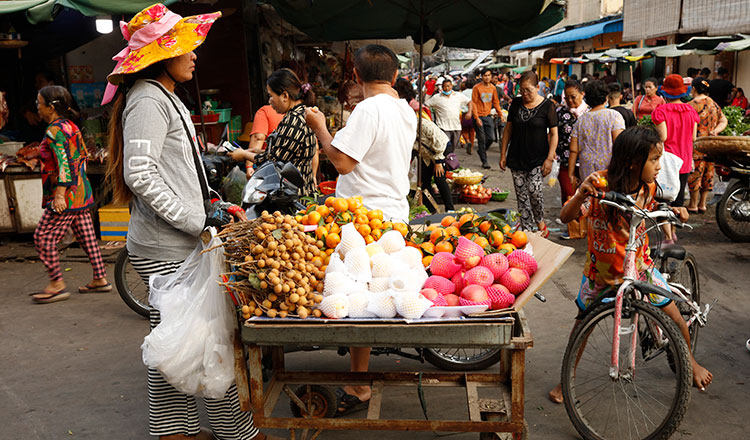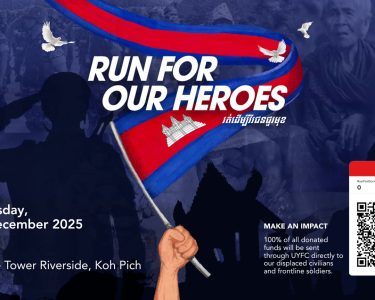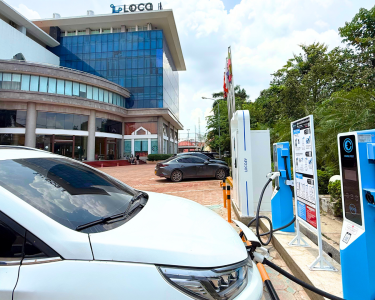Neth Chanmonyneath
Bopha starts her day at 4:30 a.m., cooking slices of meat on a small charcoal stove at her home along Veng Sreng Boulevard. She prepares affordable meals by packing the grilled meat with rice in plastic containers to sell to garment workers at a nearby factory.
On good days, her sales bring in $6 to $8, which she saves to buy medicine for her sick mother. However, on slow days, she returns home with unsold food and little to no income. Despite her hard work, Bopha faces the harsh reality of a lack of assured income, social safety nets and health coverage, leaving her vulnerable to economic distress.
Her struggles reflect those of many Cambodian informal workers, who make up 88 percent of the workforce, according to March 2024 International Labour Organization data. These workers often lack access to minimum wage and other social security benefits, emphasizing the need for better protections similar to those available to formal sector employees. Informal workers like Bopha are essential to the economy and deserve recognition and support.
The government should explore the possibility of providing a basic income to informal workers, especially women who face unstable daily earnings, unpaid care burdens, heightened safety risks and exclusion from the existing social protection system.
This income would support their livelihood, protecting them from external economic shocks like healthcare costs and other urgent family expenses. Also, a guaranteed basic income gives them capital to help their businesses and further contribute to the economy without having to take out untenable microloans that could send them into a cycle of indebtedness.
Social Protection Gaps for Informal Women Workers
In 2022, Cambodia had approximately 77,000 street vendors, many of whom are women working in markets like Phnom Penh’s Prey Toteung. Before the pandemic, these women earned between $10 and $12 a day, but factory closures significantly impacted their income, reducing it to between $3 and $6 daily without any economic support. This situation highlights the vulnerability of street vendors to financial shocks, as their earnings depend heavily on daily sales.
To address the economic hardships caused by the pandemic, the Cambodian government expanded the IDPoor program, which aims to assist the country’s most impoverished households. The program evaluates eligibility based on factors such as property ownership and family size. While IDPoor has provided targeted support, its rigid eligibility criteria and bureaucratic processes have left some informal vendors without help, even though they are at risk of falling into poverty.
A potential solution to this issue could involve transforming the IDPoor program into a basic income initiative accessible to individuals with low incomes, including informal workers. This approach would eliminate the cumbersome administrative processes of the current system and provide direct cash transfers to all economically vulnerable individuals, particularly female informal workers who often bear the financial burden for their families.
Implementing Targeted Basic Income in Prey Toteung Market
The government should implement a pilot project at Prey Toteung Market, where approximately 75 percent of the workforce consists of women, to evaluate the effectiveness of a direct cash transfer program. This market provides a manageable setting for the initiative, which would include community outreach to raise awareness and facilitate participation.
To begin, an interministerial coordination committee involving the Ministry of Social Affairs, Veterans and Youth Rehabilitation (MoSVY), the Ministry of Women’s Affairs (MoWA), and the Ministry of Economy and Finance (MEF) should convene to align the program with existing government initiatives, make necessary adjustments, allocate budgets, and define institutional responsibilities. It is crucial for each ministry to understand the economic challenges faced by women in the informal economy, who often lack access to traditional safety nets.
Local authorities in Meanchey district should compile a registry of informal women vendors in the market and categorize them by income levels. Those earning $8 per day or less, which is slightly below the minimum wage for a six-day work week, would qualify for direct cash transfers. The aim is to provide social protection to these vendors, ensuring they receive some income support comparable to the wages of garment workers.
Eligible women would receive $40 in monthly payments, reflecting the average assistance provided during the COVID-19 pandemic under the IDPoor program. These payments should be regularly reassessed to account for economic factors such as inflation and changes in minimum wage.
Additionally, collaboration with digital payment services like Wing or TrueMoney, or through the Bakong money transfer system, will streamline the cash transfer process for vendors. This initiative would not only offer financial relief but also support women in managing household expenses, such as caring for elderly relatives and funding children’s education, while providing a buffer against the uncertainties of the informal job market.
The Need to Embrace a Basic Income
A direct cash transfer system for vulnerable Cambodians and informal workers would be a starting point to address the inequities of the current social protection programs. The program will eliminate the complex administration procedure of documentation requirements, use faster and more efficient cash transfers and eliminate any potential corruption by eliminating any local government involvement.
The program will empower informal workers, starting with women informal workers, with economic support to deal with health emergencies or other financial shocks like a pandemic or economic downturn. More importantly, a program that targets women informal workers not only empowers them in the household and community but also acknowledges their critical work for our society and hopefully sets them up for a transition to the formal economy.
Neth Chanmonyneath is a Junior Research Fellow at the Future Forum, a public policy think tank based in Phnom Penh. This article was written as part of the Inclusive Policy Fellowship, an endeavour supported by the Australian Government through The Asia Foundation’s Ponlok Chomnes II: Data and Dialogue for Development in Cambodia.





